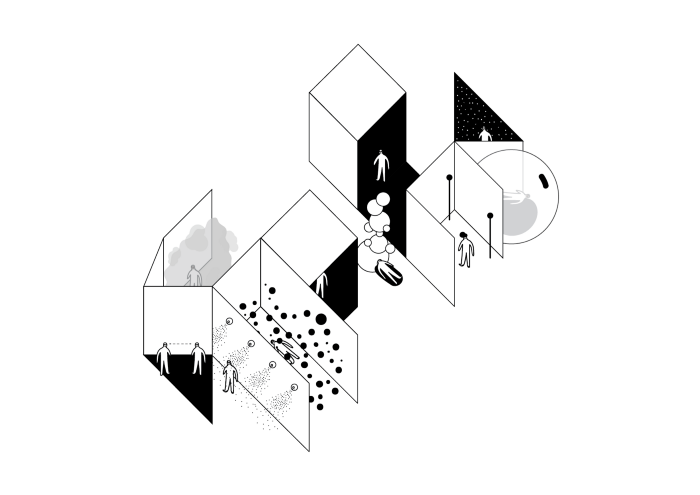What is a Well-being Workout?

In contrast to the wellness industry’s hedonistic quick fixes, MoodLab are creating spaces for meaningful well-being focused on longer-term benefits. We spoke to Founder Alejandro Ramos Saavedra to learn more about his vision for MoodLab.
How did MoodLab come about?
A few years ago, I became obsessed with how the technologies powering the personalised digital age were not really being used to build a custom physical world. When I moved to the UK to study a Masters programme, I had the chance to delve deeper into the topic and to look at it from a technical and philosophical perspective.
I reached the conclusion that the most critical type of personalisation the world needs is the personalisation of meaning, and that all the ingredients that are required to achieve it already exist. Starting a company to offer that possibility to as many people as possible was a natural next step.
What is the market opportunity for MoodLab?
The wellness industry is obsessed with hedonistic quick fixes. These are pleasure-centric products and services that have a short-term effect.
At MoodLab, we’ve identified a real demand and need for what we’re defining as meaningful well-being, a eudaemonic approach to well-being focusing on longer-term benefits, including an increased sense of carefreeness, awe, inspiration and transcendence.
At MoodLab, we’ve identified a real demand and need for what we’re defining as meaningful well-being
There’s many things out there claiming to be ‘immersive’ and ‘multi-sensorial’ but we’re not only pushing the boundaries of what that means from a creative and aesthetic perspective, we’re also finding ways of putting it to work for your own well-being.
What makes MoodLab different?
We’re starting by focusing on felt experiences in the physical world. We’re building spaces we call pavilions where our signature assessment and intervention activities (well-being check ups and workouts) take place. This allows us to be very rigorous about how these activities are delivered, to whom and when, and to learn as much as possible from how they make people feel.
The market is flooded with either clinical and off-putting, or fun but ineffective options. So we’re putting a lot of effort into making sure we hit the right intersection between the ‘cold’ world of science and tech, and the ‘hot’ world of design and art.
What does success look like for MoodLab?
We want to normalise taking care of your well-being and see ourselves becoming the go-to physical and digital destination for people wanting to connect with themselves and to others around them.
We see ourselves becoming the go-to physical and digital destination for people wanting to connect with themselves and to others around them.
For some people, it might mean doing yoga and drinking kombucha, and that’s fine, but we’ve identified that there are hundreds of millions of people around the world who are looking for something more profound and longer lasting. We’re agnostic about what that meaning is to our users, but we’re obsessed about helping them find it.
What has been the biggest challenge so far?
Starting an ‘atoms’ business means there are costs you don’t find in the ‘bits and pixels’ world. As anyone living in a space-thirsty city like London knows, finding affordable, beautiful and accessible venues can be quite intimidating.
We were lucky to be hosted by Theatre Deli, who provided access to the studio spaces where we built our prototypes and developed the core of our user journey and user experience. We have also been fortunate to find people who have supported us from very early on by lending equipment, providing access to their communities and offering space.
What have you found most surprising so far?
Getting to know more about the world-view of the British consumer has been a game changer. A significant part of my professional career has taken place in Mexico, where consumers typically come from more homogenous cultural backgrounds. The nuances in British culture can sometimes be hard to grasp, and therefore, they demand a whole new set of considerations to try to make sense of consumers.
You built MoodLab on Zinc’s company builder programme…how was this experience?
As a non-British solo founder, it can be quite challenging to find the right channels to be heard or noticed. Zinc eliminates that entry barrier and generously opens the doors to their network. It also provides access to many resources that it would be impossible to pay for on your own.
Is there a Founder that you most admire and if so, why?
I don’t believe in the mythological genius founder creature that rises from out of nowhere and succeeds against all the odds. My heroes are men and women who love what they do and make sure they become darn good at it. Hard workers who manage to gather the knowledge, create the conditions, and build the team that allows what they are most passionate about to flourish. This applies to a small bakery all the way to a multi-billion hight tech startup.
My heroes are men and women who love what they do and make sure they become darn good at it.
What support have you had in building MoodLab?
I’m yet to find a co-founder, however, I’ve built a vibrant network of advisors and collaborators that keep the vision moving forward. To me, first it’s all about finding an irrational drive. Then, you need to find the people who buy into that irrationality and are willing to chip in with their knowledge, experience, skills and resources.
What advice do you have for future entrepreneurs?
Get out of your head and start building the thing. One of the best decisions we’ve made is to put ourselves in the position of having to deliver a new version of our product every two weeks, rain, hail or shine.
Get out of your head and start building the thing.
This means having to test it with real users and to understand what it takes to build and run the thing. It also means that there’s no time for getting too precious about what we’re building. The pace is exhausting, but it’s fuelled by the adrenaline coming from all the fresh findings and insights.
What’s next for MoodLab?
From a business perspective, we want to try and fund MoodLab primarily through revenue. We think we can do this by catering to the B2B market from very early on, and channeling resources to the R&D of a B2C product that can be accessed by as many people as possible.
What this means in real life, is that we’re building a lot of pavilions, doing a lot of user testing, designing hundreds of activities and testing many different types of datafication techniques and controller systems. We’re getting ready to put our services out there as soon as possible.
Sign up at www.moodlab.me to try out MoodLab’s signature well-being check ups and workouts and follow @mood.laboratory on Instagram.
Join the Zinc community
Stay up to date with all Zinc updates and future posts as part of our fast growing community.
Featured Resources
Impact Report 2023
We started Zinc with the hypothesis that missions are an effective way to attract highly ambitious, talented and experienced groups of innovators, who might not recognise themselves as “classic entrepreneurs” but are ready and able to start a new commercial and successful venture to tackle some of our most pressing societal issues.
The world has overcome the sorts of challenges we face today when it has adopted a mission-based approach to the biggest problems and brought together world-class talent to invent and innovate, e.g: NASA and landing a man on the moon, the LSE blueprinting the British welfare state, or the Gates Foundation aiming to eradicate diseases.
On this basis and assumption, we designed Zinc as a new mission-based Venture Builder — a place where global talent, ‘impact makers’, can join to experiment and develop new solutions to our most pressing societal issues.
To Eliminate Environmental Threats to Our Health
Environmental health threats pose a grave danger to human health and well-being, causing suffering to individuals and communities worldwide. These threats, which include chemical pollution, climate change, and biological hazards, cause acute and chronic diseases and exacerbate existing health conditions.
To protect those we care about, we must tackle the causes of environmental degradation, shield people from the consequences of environmental harm, and, where protection fails, we must mitigate the health impacts they suffer.
This demands action to improve all aspects of our environment: soil, food, air, water, and the built environment. It requires us to focus on every aspect of human health to reduce suffering.
Entrepreneurship and technology are powerful means to tackle these challenges. That’s why we are backing 70 founders to build innovative companies addressing this mission.


